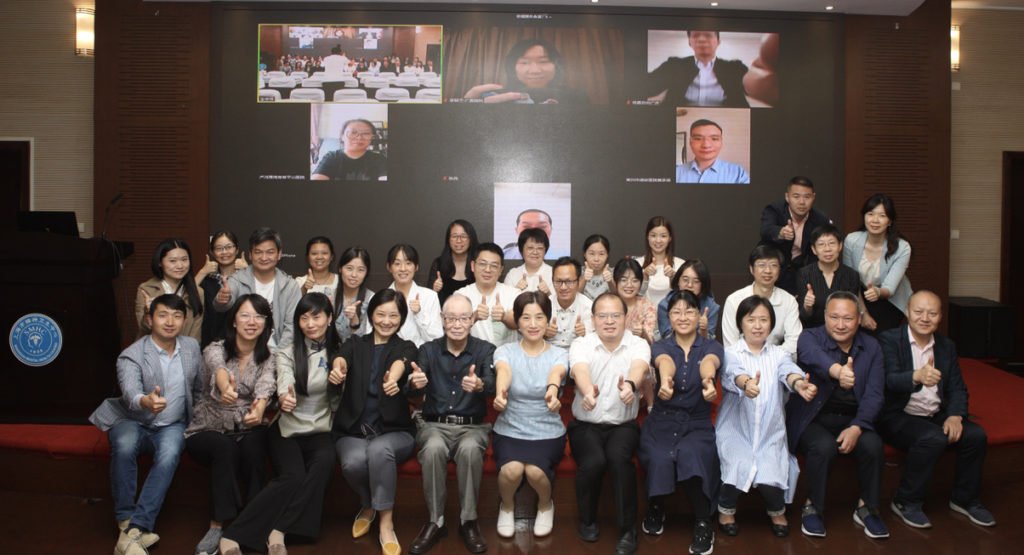This article is part of a series that aims to highlight how countries around the world have been preparing to implement the ICD-11 Clinical Descriptions and Diagnostic Requirements (CDDR) for Mental, Behavioural, or Neurodevelopmental Disorders.
Dr. Min Zhao is professor at Shanghai Mental Health Center-WHO Collaborating Centre for Research and Training and a current chair of the WHO ICD-11 International Advisory Group on Training and Implementation. Dr. Jiang Long is psychiatrist at the Shanghai Mental Health Center-WHO Collaborating Centre for Research and Training and a former consultant to the WHO Department of Mental Health and Substance Use (2020-2021). In this interview, Dr. Zhao and Dr. Long offer insight on how China is moving forward with the implementation process at the national level.
Since 2007, China has actively collaborated with the World Health Organization and international colleagues on work related to the ICD-11. Could you tell us about your team’s involvement in the ICD-11 development and field testing process?
Dr. Zhao: In the past decade, our team and colleagues in China have been part of multiple International Advisory Groups and Working Groups for the revision and testing of the ICD-11 Clinical Descriptions and Diagnostic Requirements (CDDR). Our hospital, the Shanghai Mental Health Center (SMHC) regularly hosted meetings as part of the International Advisory Group for the Revision of ICD-10 Mental and Behavioral Disorders. During these meetings, we discussed research protocols, findings, publications, and plans related to ICD-11 development and field testing. My roles over the years have included serving as a member of both the International Advisory Group and Field Studies Coordination Group, leading the International Field Study Center in China, and championing the growth of the Global Clinical Practice Network (GCPN).
Notably, GCPN members in China have participated in online and field-testing studies since 2013. As a designated International Field Study Center, SMHC has conducted studies to understand if clinicians found the revised ICD-11 guidelines to be useful in practice and to assess whether the guidelines can be reliably applied in real-world contexts with clinicians and patients. Additionally, I have also served as a member of the ICD-11 Working Group on the Classification of Substance-Related and Addictive Disorders and our team at SMHC have engaged in research to explore the utility and reliability of substance use disorders classification and hear from doctors and patients on how they view the ICD-11 guidelines specific to substance use and addiction. It has been really rewarding to be actively part of the global efforts to shape the ICD-11.
How have your team and country prepared for the official implementation of the ICD-11?
Dr. Zhao: After most of the content in the ICD-11 CDDR was finalized in June 2018, our team at the Shanghai Mental Health Center immediately began coordinating efforts with various government and professional agencies to lead the implementation and training plan for our country. We worked with expert practitioners to develop the official translation of the ICD-11 in Chinese and partnered with professional associations and boards to share critical information about the ICD-11. In November 2018, we launched our official training program, the China-WHO ICD-11 Diagnostic Guidelines on Mental, Behavioural, and Neurodevelopmental Disorders Ladder/Graduated Training Program. This Training Program was strategically designed to disseminate information in a graduated manner by first training a group of 300 psychiatrists representing various regions in China. For two years, these psychiatrists were trained and then coached to become trainers themselves at their local hospitals and clinics. Given the size of China, this Training Program allowed us to build a network of trainers and a system to disseminate information to clinicians throughout the country effectively.
Additionally, our core group of expert trainers continues to provide more intensive training at conferences as part of ongoing professional development for psychiatrists and psychologists. We’ve noticed that trainings on anxiety, depression, bipolar disorders, and substance use disorders seem to be most popular and of interest to clinicians.
As a third part of implementation and dissemination, we are building an online training platform where Chinese professionals can learn the ICD-11 at their own pace. On our platform, Chinese psychiatrists will also have the ability to consult directly with expert psychiatrists to enhance their learning.

What have been some successes and challenges in the ICD-11 development and implementation process?
Dr. Zhao: Over the years, we’ve successfully carried out ICD-11 field studies and training for a couple of reasons. First, Chinese clinicians recognize the significance of the ICD-11 and see how the new system can meaningfully impact psychiatric services. So, they are generally very interested in participating in ICD-11-related programs. The second element crucial to our success is having solid organizational-level support from our hospital. Because SMHC has invested human and financial resources in this work, we can have dedicated project teams and staff, like Dr. Jingjing Huang and Dr. Jiang Long, who lead in organizing and implementing these initiatives on the ground.
A challenge we have encountered is the process of translating the ICD-11 diagnostic requirements into Chinese. We began this process in 2018, and we have assembled teams of content-area experts who review the translations iteratively. In each round of review, the teams carefully consider cultural differences and identify the most appropriate and accurate terminology. This is a huge undertaking – we are now in our fifth round of review for the Chinese version, and due to ongoing updates in the English version of the ICD-11, we will continue to edit the Chinese translations to reflect these changes before formal publication.
What recommendations or advice would you share with other countries preparing to implement the ICD-11?
Dr. Zhao: My recommendation for any countries partaking in the translation process of the ICD-11 is first to recruit individuals who have content-area expertise and are most familiar with a specific grouping in the ICD-11, whether it be substance use disorders, anxiety, depression, etc. It is critical that the guidelines are translated by health professionals who understand the specific symptoms and underlying concepts in each disorder and grouping. Second, I would recommend developing a network of experts who can provide training on a specific area of the ICD-11. Third, implementation is a big responsibility and a huge process, requiring a lot of human resources. Obtaining government and organizational level support is very important so that the financial resources are available to support the people who are committed to doing the work.
What do you see as current mental health priorities in China?
Dr. Zhao and Dr. Long: In China, more social support is needed for individuals who are living with mental health conditions. We need to reduce the stigma and bias that is often associated with mental illness and widely promote the notion that mental health is just as important as physical health. Additionally, we need to focus on increasing the capacity and infrastructure for mental health care. Expanding preventative efforts will be especially important since we know that mental health screening and early detection can help to improve treatment outcomes for patients. Furthermore, investment in workforce development is needed – particularly for social workers – such that they can be embedded into each component of the mental health care system, from prevention, treatment, and recovery to follow-up. We can glean insight from other countries, such as Canada and Australia, that have already taken steps to strengthen the education and training of social workers. Although Shanghai has already moved in this direction, it will take longer for other provinces and cities in China to likewise build up their workforce of social workers.
The GCPN is comprised of 16,000 clinicians from over 160 countries. If a GCPN member were to visit China, what would you recommend that they make sure not to miss?
Dr. Long: The top four places I would recommend for visitors to China are Xi’an, Beijing, Shanghai, and Guangzhou. These are among the largest, metropolitan cities in China and each has its own character, culture, and history. But if I could choose to highlight one, I would recommend Xi’an for first-time visitors. Xi’an served as the capital of 13 imperial dynasties in Chinese history (over approximately 1200 years) and is home to the famous Terra-cotta Army, a UNESCO World Heritage site. Xi’an is also known for its delicious, savory cuisines and is extremely accessible with subways, buses, and bike lanes throughout the city. Of course, Shanghai, where our hospital and our team are based, is always a wonderful place to visit too. It is a futuristic city with many charms and exciting attractions. We really enjoy living and working here!
*****
Acknowledgements: This article was prepared by Rayna Wang with editing support from Patricia Dunne.


